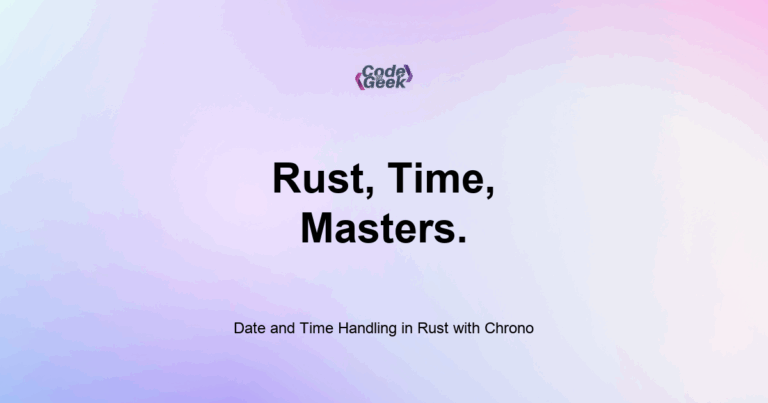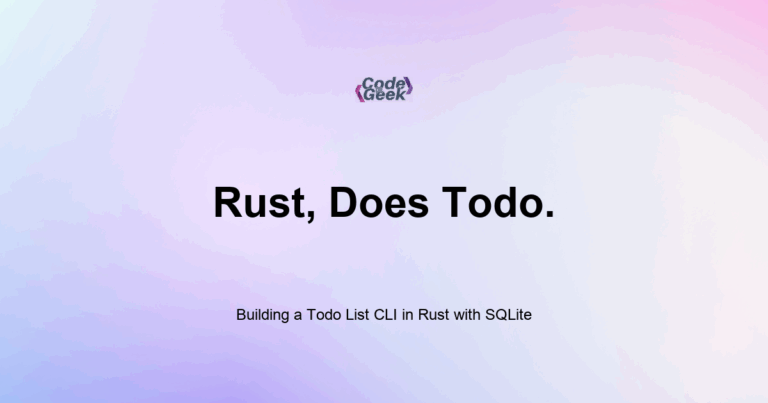New to Rust? Grab our free Rust for Beginners eBook Get it free →
Date and Time Handling in Rust with Chrono

The chrono crate is the standard way to work with dates and times in Rust. It helps you parse, format, and perform arithmetic on dates and times, whether you are building logs, schedulers, or working with timestamps from APIs.
I first used chrono when logging events in a CLI tool. I needed readable timestamps, but I also wanted to sort and calculate durations. Chrono handled everything I needed, from getting the current time to formatting it exactly how I wanted, all with full type safety.
This article will show you how to use chrono to work with current time, format it, parse strings into dates, perform time arithmetic, and work with time zones.
Add chrono to Your Project
In Cargo.toml:
[dependencies]
chrono = "0.4"
Chrono supports both naive (timezone-unaware) and UTC/local time handling.
Getting the Current Time
Use Utc::now() or Local::now():
use chrono::Utc;
fn main() {
let now = Utc::now();
println!("Current UTC time: {}", now);
}
For local time:
use chrono::Local;
fn main() {
let local = Local::now();
println!("Local time: {}", local);
}
Both give you a DateTime object.
Formatting Dates and Times
Use format with strftime-like strings:
use chrono::Local;
fn main() {
let now = Local::now();
let formatted = now.format("%Y-%m-%d %H:%M:%S");
println!("Formatted: {}", formatted);
}
Common format patterns:
- %Y = Year
- %m = Month
- %d = Day
- %H:%M:%S = Hours:Minutes:Seconds
Parsing Strings into DateTime
You can turn strings into NaiveDateTime:
use chrono::NaiveDateTime;
fn main() {
let input = "2025-06-10 18:00:00";
let dt = NaiveDateTime::parse_from_str(input, "%Y-%m-%d %H:%M:%S")
.expect("Invalid date");
println!("Parsed: {}", dt);
}
This is useful when reading logs or config files.
Time Arithmetic
You can add or subtract durations:
use chrono::{Duration, Utc};
fn main() {
let now = Utc::now();
let later = now + Duration::days(3);
let earlier = now - Duration::hours(5);
println!("3 days later: {}", later);
println!("5 hours earlier: {}", earlier);
}
Duration supports days, hours, minutes, seconds, and milliseconds.
Getting Date Components
You can access year, month, day, etc:
let date = Utc::now().date_naive();
println!("Year: {}", date.year());
println!("Month: {}", date.month());
println!("Day: {}", date.day());
Useful for grouping or filtering by date parts.
Timestamps
To get a Unix timestamp:
let now = Utc::now();
let timestamp = now.timestamp(); // seconds since epoch
println!("Timestamp: {}", timestamp);
To convert from timestamp:
let dt = chrono::NaiveDateTime::from_timestamp_opt(1_600_000_000, 0)
.expect("Invalid timestamp");
println!("DateTime: {}", dt);
You can also use timestamp_millis or timestamp_nanos.
Working with Time Zones
You can convert between time zones:
use chrono::{Utc, Local};
let utc_time = Utc::now();
let local_time = utc_time.with_timezone(&Local);
println!("Local time: {}", local_time);
Chrono does not handle timezone database lookups (like IANA), but it supports UTC and system-local conversion.
Summary
The chrono crate makes it easy to work with dates and times in Rust. From formatting to arithmetic to converting between UTC and local, it covers the core functionality every application needs. Whether you are scheduling tasks or printing logs, Chrono helps you do it safely and correctly.
Rust Intermediate Concepts
- Generic Types in Functions and Structs
- Implementing Traits for Custom Behavior in Rust
- Trait Bounds and Constraints in Rust
- Lifetimes in Rust
- Using Closures (Anonymous Functions) in Rust
- The Iterator Trait and .next() in Rust
- Higher Order Iterator Methods: map, filter, and fold in Rust
- Using impl Trait for Simplicity in Rust
- Advanced Collections: HashSet and BTreeMap in Rust
- Custom Error Types and the Error Trait in Rust
- Option and Result Combinators in Rust
- Writing Unit Tests in Rust
- Integration Testing in Rust
- Logging in Rust with the log Crate
- Cargo Tips and Tricks for Rust Projects
- CLI Argument Parsing with Clap in Rust
- File I/O and File System Operations in Rust
- Running External Commands in Rust
- Make HTTP Requests in Rust with Reqwest
- JSON Serialization and Deserialization in Rust with Serde
- Building a Weather CLI in Rust
- Date and Time Handling in Rust with Chrono
- Using Regular Expressions in Rust with the regex Crate
- Memory Management in Rust
- Understanding Borrow Checker Errors in Rust
- Interacting with Databases in Rust
- Building a Todo List CLI in Rust with SQLite
- Concurrency in Rust




